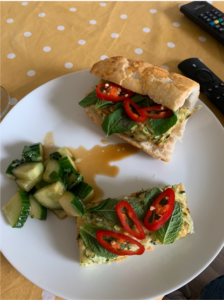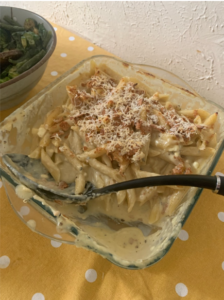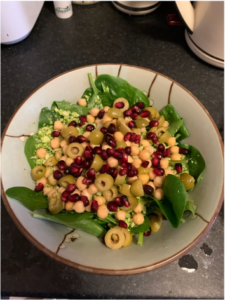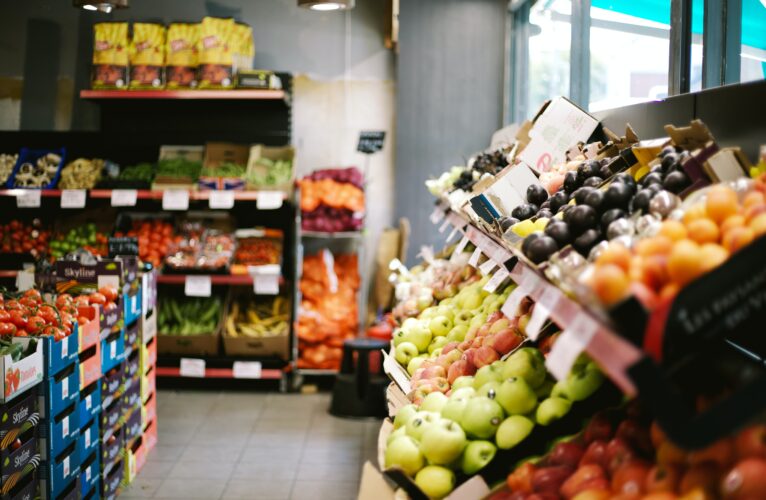If you struggle to use everything up, to always have something in to eat, often resort to takeaway or find your weekly shops too expensive, Katie’s guide to eating well on a budget is for you.
University life can be expensive, and some people find it difficult to afford their rent, never mind everything that comes after that. One of the best ways I’ve found to save money is to shop and cook smart. Not only does this help financially, but it also helps me to make sure I’m getting plenty of good, tasty, nutritious food, which is super important for fuelling your studies.
Get inspired.
I like to have a compilation of cheap, easy, go-to recipes saved so I don’t get too overwhelmed when I sit down to write my shopping list. You could just save names of easy dishes you already know how to make (like stir fry or tomato pasta), or save links to recipes you need to refer to while cooking.
Some of my favourite places for budget recipe inspiration are:
- Cooking on a Bootstrap – Jack Monroe is the absolute queen of budget cooking, with most of her delicious recipes costing less than £1. I particularly like the Spaghetti Parmigiana (I eat this most weeks) and the ‘Guinness’ Brownies. If you only take one thing away from this blog, please check out her website and recipe books.
- BBC Good Food is another classic recipe source. They’re great for basics when you’re making them for the first time, and I find their recipes pretty fool-proof. They also have a great budget cooking section.
- My flatmates and I are all big fans of the Tesco Magazine – they release a new issue monthly so it’s ideal for seasonal cooking. Their ‘5 for under £25’ section is ideal for budget cooking, but don’t forget to scale down if you’re just making one or two portions.
- The Student Food Project has loads of easy meals designed for students, most of which just make one or two portions which is ideal for avoiding food waste if you’re only cooking for yourself.
- YouTube can also be a great place to get inspiration. Mina Rome and Madeleine Olivia both have vegan budget cooking videos with lots of lovely recipes.
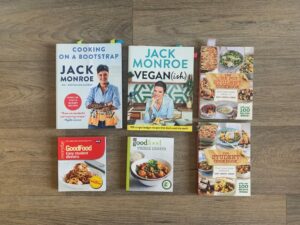
Plan smart.
One of the biggest and most common mistakes people make when it comes to budget eating is not planning out what to eat that week. Lack of planning leads to food waste (food wasted = money wasted), last minute trips to the shop to buy missing ingredients (which means spending more money, more often), or resorting to ‘hangry’ takeaways.
Here are my top tips for effective meal planning:
- Make a list of all the days of the week and fill in a breakfast, lunch and dinner dish for each day. Make sure to add in any meals out with friends you’ve got planned so you don’t buy meals you don’t need.
- Check how many portions each recipe makes – you probably won’t need to make seven dinners for seven days. I tend to aim for two portions so I can cook every other day and eat leftovers in between.
- Choose recipes with common ingredients between them. That way you won’t have as much food waste and save money by only buying things you’ll definitely use up. This video by ‘Pick Up Limes’ is a really good example of how to do this.
Shop smart.
Shopping smart is vital in sticking to your budget.
- Choose a cheap supermarket. It might seem like each item doesn’t cost that much less than somewhere more expensive, but the pennies add up fast. It’s definitely worth walking an extra few minutes to get to a cheaper supermarket, especially for your big weekly shop.
- Buy supermarket own brand rather than fancy brands. Often, big brands pay extra to be at eye-level in the shop, so make sure to crouch down and check the bottom shelves for a cheaper option.
- Look out for deals and discounts on things you buy regularly (like pasta or rice) so you can stock up, but don’t be sucked into buying something you don’t actually need just because it’s on sale.
- It’s often cheaper to eat vegetarian and vegan meals, especially if you stick to pulses (beans, lentils etc) for protein rather than meat-replacement products. Tinned or frozen fruits and vegetables are also often cheaper than fresh. Most budget recipes will focus on these ingredients, so look out for them when you’re looking for inspiration.
- Never shop while hungry! It’s too easy to buy all sorts of random things rather than sticking to the plan. I like to go on a Sunday morning right after breakfast when the shops are quiet.

Eat smart.
Once you’ve got your meal plan, recipes and food, the next step is to eat smart:
- Start with the fresh fruit, veg and meat first so that you definitely eat it before it goes off. You can get to recipes which mostly use store cupboard items, tinned ingredients or vegetables that last longer later on in the week.
- Eat leftovers for dinner the next day or take them for packed lunches.
- If you’re not going to manage to eat your leftovers before they go off, put them in a tupperware or old takeaway box and freeze them for a rainy day.
- If something may expire before you’ve had time to eat it, cook the recipe early and stick it in the fridge or freezer until you’re ready to eat it.
- There are microwaves and boiling water taps dotted around campus which have saved me so much money by avoiding buying food and coffee every day. I always use the microwaves at Teviot and Potterrow to heat up soup for lunch. The hot water taps at the Main Library are perfect to make tea with a bag brought from home, or a latte with those ‘just add water’ sachets you can get. A whole box of sachets costs less than one coffee from a coffee shop!
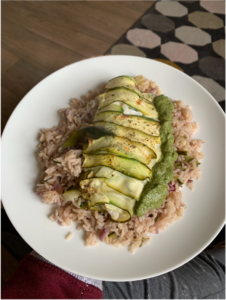
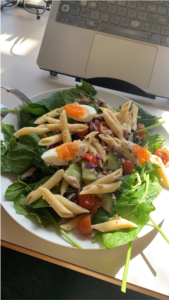
-
Eat well.
Eating well is one of the most basic but important things you can do to look after yourself. The main point of this blog is to show you how to feed yourself plenty for less, but there should still be room for treats, takeaways and coffees out. Don’t be too hard on yourself. If you’re struggling with money, you can find out about getting support here, and if you’re not feeding yourself properly and struggling with your mental health, you can get help here. Food should be fun, and I hope this helps take the stress out of it.
